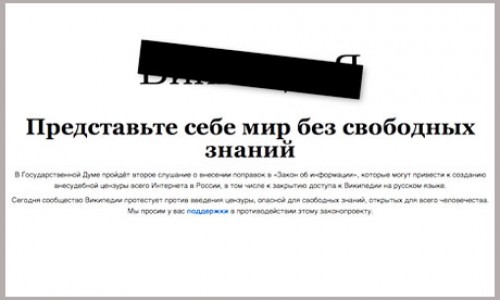Freedom of Speech Roundup
by Sampsonia Way / July 14, 2012 / No comments
In the Weekly Freedom of Speech Roundup Sampsonia Way presents some of the week’s top news on freedom of expression, journalists in danger, artists in exile, and banned literature.

Wikipedia shut down its Russian-language page to protest a bill that would increase government control over the internet. Photo: Wikipedia
This week, troubling news comes from Ethiopia, where journalist Eskinder Nega was sentenced to 18 years in prison after being convicted on vague terrorism charges. There were also reports of China disabling internet access and text messaging in the Tibetan region of Ganzi for two days. There was better news in Sri Lanka, where an attempt to abduct journalist Shantha Wijessoriya failed. And though it has yet to be seen in practice, the UN has declared Internet freedom to be a human right.
Below are links to these and other relevant stories from July 4 to July 11, 2012.
Russian Wikipedia in Shutdown Protest over Internet Censorship
The Guardian. Wikipedia shut down its Russian-language page on Tuesday to protest at a bill that would boost government control over the internet. Read Here
The Photography of Omar Rodríguez Saludes (Slideshow)
The New York Times. Mr. Rodríguez Saludes was a self-taught photographer who was considered among the best of the Cuba’s up-and-coming independent journalists. In 2003 he was sentenced to 27 years in prison. Read Here
Kidnapping of Sri Lankan Journalist Thwarted
Sri Lanka X News. Shantha Wijesooriya addressed a written complaint to the Sri Lankan police department after an attempt to abduct him was made by a group suspected to be part of the government’s security division. Read Here
Rights Groups Flay Sri Lanka’s Bid to Defend Terror Campaign on Media
JDS Lanka. In a recent trip to Tokyo, Sri Lanka’s foreign minister claimed that media shut-downs and arrests are ‘justified’ as ways “to protect privacy and safeguard reputations.” Read Here
Ethiopian Court Sentences Dissident Blogger to 18 Years in Prison
The Washington Post. Ethiopian journalist Eskinder Nega was convicted of terrorism charges along with 23 other journalists and rights defenders on June 27. On Friday, July 13 he was sentenced to 18 years in prison. Read Here
Postcard From Turkey: Criminal Trials of Major Publishers
PEN. Turkish publishers await a verdict for publishing “obscene” material: Works by William S. Burroughs and Chuck Palahniuk. Read Here
Burmese Days
The New York Review of Books. “Despite all the undeniable signs of progress, no one can yet claim that Burma is on an irresistible path to democracy.” Two new books: The Lady and the Peacock: The Life of Aung San Suu Kyi and Where China Meets India: Burma and the New Crossroads of Asia. Read Here
Internet Freedom Affirmed as a Right
ITWeb. With support from 30 of the 47 UN Council members, including China, Egypt, Libya, Morocco and Tunisia, Internet freedom has been declared a human right. Its application remains to be seen. Read Here
Defining the ‘We’ in the Declaration of Internet Freedom
The Atlantic. Last week, a collection of Internet bold-faced names rolled out a Declaration of Internet Freedom, championing expression, access, openness, innovation, and privacy. But what does it mean? Read Here
Happy Birthday, Dalai Lama: China Celebrates by Cutting Comms in Tibetan Region
Uncut. China disabled both text messaging and internet access for two days in Ganzi prefecture, a Tibetan autonomous region in western Sichuan province. Read Here
Interview: Professor Mickey Huff Seeks Media Accountability with Project Censored
TLC. “The mission of Project Censored is to teach students and the public about the role of a free press in a free society—and to ‘tell the News That Didn’t Make the News and Why.’” Read Here
Ten Things You Might Not Know About Cens*rsh*p
Chicago Tribune. From Richard Wright to the Catholic church to recent numbers on the Shanghai stock exchange, here is a list of 10 tidbits about censorship that “some people might not want you to know.” Read Here




